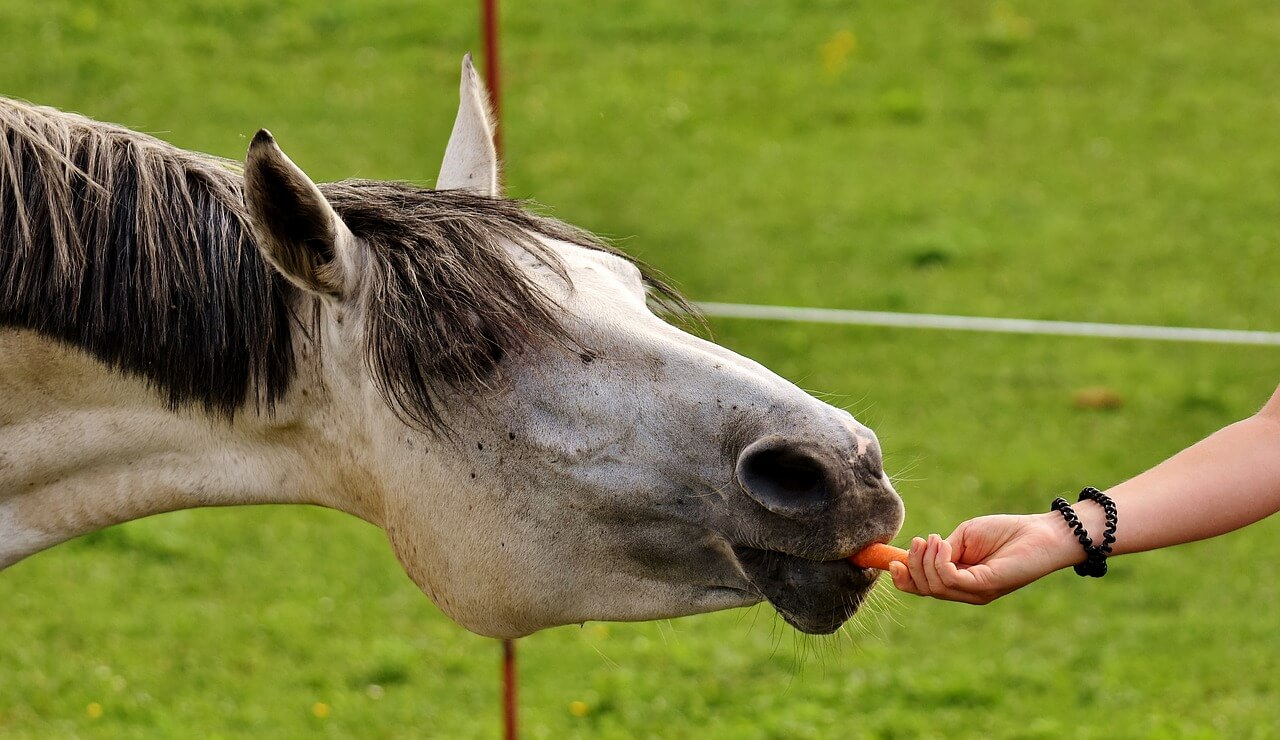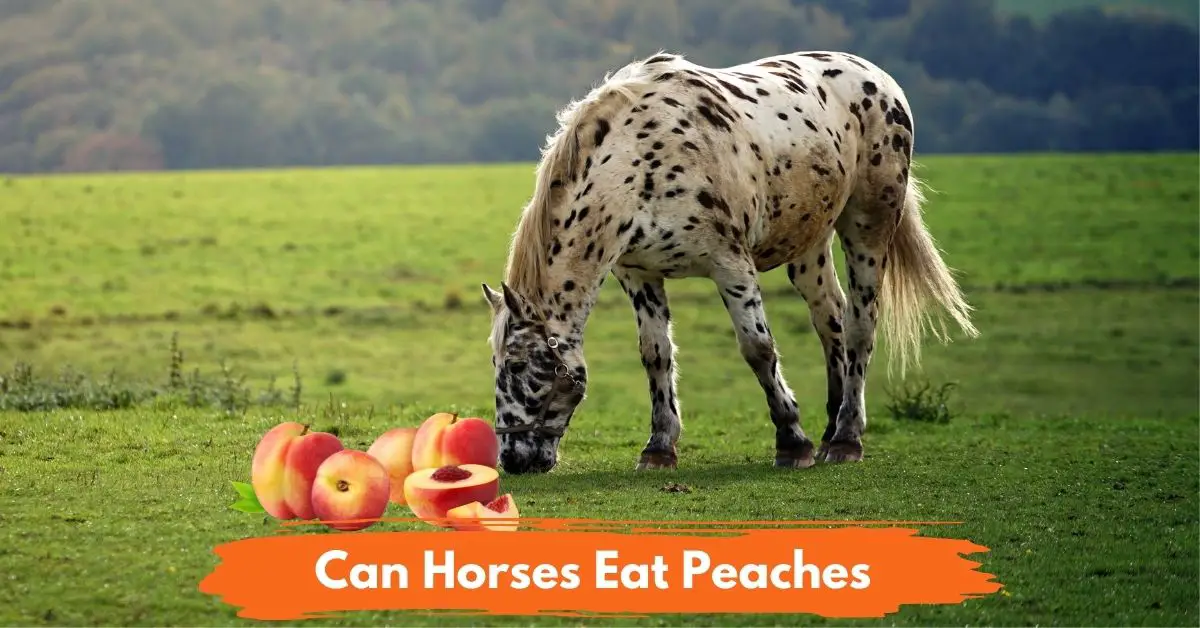Yes, horses can eat peaches. They can safely consume this fruit in moderation as a treat.
Horses have an extensive diet that mainly consists of hay, grass, and grains. However, they can also enjoy certain fruits as occasional treats. One such fruit is peaches. While horses predominantly thrive on a fiber-rich diet, offering them a small amount of peaches can be a delightful and healthy addition to their meals.
Peaches are not toxic to horses and can be fed to them without causing harm. However, it is crucial to remember that peaches should only be given in moderation. Providing excessive amounts of peaches or any other fruit can disrupt the nutritional balance in a horse’s diet and potentially lead to health issues. Therefore, responsible horse owners should offer peaches sparingly and monitor their horse’s overall dietary intake for optimal well-being.
1. Are Peaches Safe For Horses?
Are Peaches Safe for Horses?
Peaches can be a tasty treat for humans, but is it safe for horses to eat them? While it may seem like a harmless indulgence, there are potential risks and health concerns to consider when feeding peaches to horses.
Potential risks and health concerns
One of the main concerns with feeding peaches to horses is their digestive system. Horses have a sensitive digestive tract, and foods that are too rich or high in sugar can cause digestive upset, such as colic or diarrhea. Peaches, being a fruit with natural sugars, fall into this category.
Digestive system considerations
In addition to their sensitive digestive system, horses also have a limited ability to digest certain fruits. While some horses may be able to tolerate small amounts of peaches without issue, others may experience digestive disturbances. It’s important to monitor the horse’s response and adjust their diet accordingly.
Key factors in determining safety
When it comes to determining the safety of feeding peaches to horses, there are a few key factors to consider:
| Quantity | Feeding peaches in moderation is crucial to avoid overloading the horse’s digestive system. Small amounts as a treat should generally be fine, but excessive consumption can lead to problems. |
| Ripe vs unripe | While ripe peaches may be more tempting, unripe ones can be harder to digest and may cause more issues for horses. It’s best to offer fully ripe peaches. |
| Pit removal | It is essential to remove the pit from the peach before feeding it to a horse. The pit can be a choking hazard and should never be consumed. |
Overall, peaches can be offered as an occasional treat for horses, but it’s important to monitor their response and feed them in moderation to avoid any potential digestive issues.
2. Nutritional Benefits Of Peaches For Horses
Can horses eat peaches? Absolutely! Peaches are not only delicious for humans but can also offer nutritional benefits to horses. Peaches are rich in essential vitamins and minerals, such as vitamin A, vitamin C, potassium, and fiber. These nutrients play a crucial role in maintaining your horse’s overall health and well-being.
Additionally, peaches contain antioxidant properties that can help reduce oxidative stress and inflammation in horses. As a result, horses may experience potential dietary advantages from consuming peaches, such as improved immune function and reduced risk of chronic diseases.
It is important to note, however, that moderation is key. While peaches can be a healthy addition to a horse’s diet, they should be given in appropriate quantities and offered as a treat rather than a staple food. Always introduce new foods gradually and monitor your horse’s reaction to ensure they tolerate peaches well.
3. Proper Preparation And Serving Methods
Horses can eat peaches, but proper preparation and serving methods are crucial to ensure their safety and optimal digestion. When serving peaches to horses, it is important to clean them thoroughly and remove the pit. The pit of the peach contains a hard shell that can be difficult for horses to digest and may cause obstructions in their digestive system.
Ideal serving sizes for horses vary depending on their size and weight. As a general guideline, start with small amounts and observe how your horse responds. If there are no adverse reactions, you can increase the serving size gradually. It is also important to note that peaches should be served as an occasional treat and not as a regular part of their diet.
If you want to combine peaches with other horse-friendly foods, consider options such as apples, carrots, or oats. Mixing different fruits and vegetables can provide a variety of flavors and nutrients for your horse.
4. Healthy Alternatives To Peaches
In a horse’s diet, it is important to consider healthy alternatives to peaches. While peaches can be a tasty treat for horses, they should be given in moderation due to their high sugar content. Instead of peaches, there are a variety of fruits that can provide similar nutrients for horses.
| Recommended Fruits for Horses | Nutritional Benefits |
|---|---|
| Apples | High in fiber, vitamins, and minerals |
| Carrots | Rich in vitamins A and C, and beta-carotene |
| Watermelons | Hydrating and a source of vitamins A and C |
| Bananas | Provide potassium and energy |
It is important to remember that fruits should be given to horses in moderation as part of a balanced diet. Like humans, horses benefit from a variety of foods to ensure they receive all the necessary nutrients. Providing a diverse range of fruits, vegetables, and grains can help maintain a healthy equine diet.
5. Important Considerations For Feeding Peaches
htmlFeeding peaches to horses requires important considerations to ensure their health and well-being. Allergies and individual sensitivities should be taken into account before introducing peaches into a horse’s diet. Horses may have allergic reactions or sensitivities to certain foods, including peaches, which can cause discomfort and adverse reactions. It is essential to monitor the signs of discomfort or adverse reactions when introducing any new food to a horse’s diet. If any signs of discomfort or adverse reactions are observed, it is crucial to consult with a veterinarian or equine nutritionist to verify if peaches are suitable for the horse’s diet. These professionals can provide guidance on whether peaches can be safely incorporated into a horse’s diet based on their specific needs and dietary requirements.
6. Incorporating Peaches Into Equine Treats And Recipes
When it comes to incorporating peaches into equine treats and recipes, it’s essential to blend them with horse-approved ingredients. Peaches add a flavorful twist to homemade horse treats, providing a burst of sweetness that horses will enjoy. DIY recipes for homemade horse treats can be easily adapted to include peaches as a main ingredient. It’s important to ensure safety and portion control in treats to prevent any adverse effects on the horses’ health. Too many peaches or excessive treats can lead to digestive issues, so it’s crucial to moderate the amount given to the horses. By blending peaches with other horse-approved ingredients and carefully monitoring portion sizes, you can create delicious and enticing treats that your equine companions will love.
7. Other Foods To Avoid Feeding Horses
Horses have a unique digestive system that is designed to process certain types of food, and it is important for their owners and caretakers to understand what is safe for them to eat. While horses can consume a variety of fruits and vegetables, peaches are not recommended. In fact, there are several other foods that are potentially toxic to horses. It is crucial to be aware of these foods and plants to prevent any harm to the animals.
| List of toxic foods and plants |
|---|
| Grapes |
| Onions |
| Chocolate |
| Tomatoes |
| Avocado |
Some horse owners may have misconceptions or believe in myths about what horses can eat. For example, some people may think that horses can safely consume any type of fruit or vegetable. However, it is important to do thorough research and consult with a veterinarian to ensure the horse’s diet is well-balanced and appropriate.
Sticking to a recommended equine diet provides many benefits. It helps maintain the horse’s health and prevents any potential digestive issues. A balanced diet also supports the horse’s overall well-being, including their coat condition and immune system. By feeding horses the right types and amounts of food, owners can keep their beloved animals happy and healthy.
8. Tips For Maintaining A Balanced Equine Diet
Proper forage and hay selection plays a crucial role in ensuring a well-rounded equine meal plan. Quality forage is essential for a horse’s digestive system and overall health. Hay should be analyzed to determine its nutrient content. Good-quality hay should be free from mold and dust. Providing a variety of hay types can help meet different nutritional needs.
Creating a balanced equine diet requires careful consideration of nutritional needs and health objectives. Formulating a meal plan should take into account the horse’s age, activity level, and body condition. Consulting with a veterinarian or equine nutritionist can help determine the correct balance of protein, carbohydrates, vitamins, and minerals.
| Forage | Amount |
|---|---|
| Grass hay | 80% |
| Legume hay | 20% |
| Supplements | As needed |
Proper forage and hay selection, combined with a balanced meal plan, are key to maintaining a healthy equine diet. Regular monitoring and adjustments based on the horse’s changing needs are vital to ensure their optimal well-being.
9. Conclusion: Treating Horses Responsibly
Final Thoughts On Feeding Peaches To Horses Responsibly
When it comes to feeding peaches to horses, it is essential to prioritize their well-being. While peaches may seem like a tasty treat, it is important to exercise caution and ensure responsible pet ownership principles are followed. Encouraging healthy eating habits for equines involves understanding their dietary needs and providing appropriate feed options.
Peaches should be introduced to a horse’s diet in moderation and under supervision. It is crucial to remove the pit and cut the fruit into small, manageable pieces to minimize the risk of choking. Additionally, monitoring the horse’s reaction to peaches is vital as some horses may have sensitivities or allergies.
In conclusion, responsible horse ownership means being mindful of what we feed our equine companions. While peaches can be enjoyed as an occasional treat, it is essential to prioritize their health and well-being by providing a balanced and appropriate diet.

Credit: equestrianco.com
Frequently Asked Questions For Can Horses Eat Peaches
Can Horses Eat Peaches?
Peaches are safe for horses to eat in moderation. However, it’s important to remove the pit as it contains traces of cyanide, which is harmful to horses. Make sure to cut the peaches into small, manageable pieces to prevent choking and monitor your horse’s digestion for any adverse reactions.
Conclusion
Peaches may seem tempting to feed to our equine friends, but it is crucial to approach this with caution. While horses enjoy a variety of fruits, including apples and carrots, peaches contain a pit that poses a choking hazard. Furthermore, the high sugar content in peaches can lead to digestive issues and weight gain in horses.
It’s essential to prioritize their well-being by sticking to their regular diet and consulting a veterinarian for any concerns. Remember, a happy and healthy horse is always a top priority!

